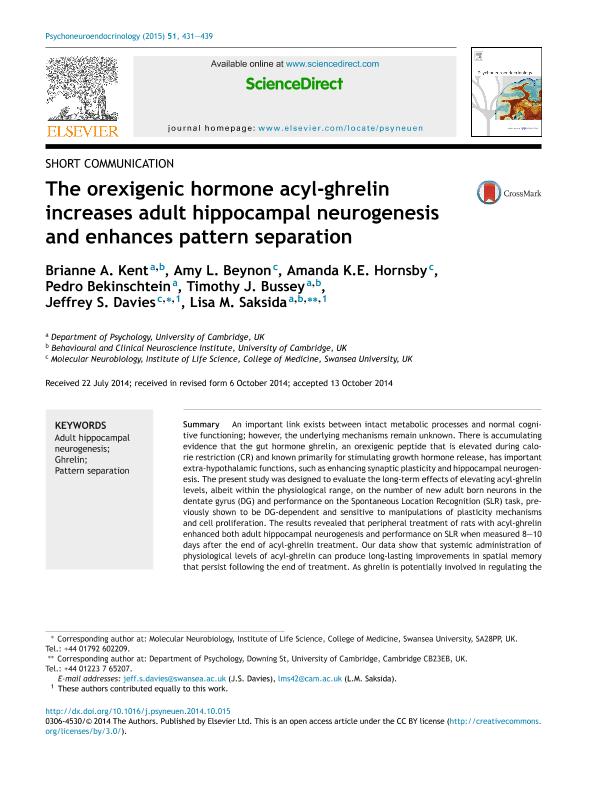Mostrar el registro sencillo del ítem
dc.contributor.author
Kent, Brianne A.
dc.contributor.author
Beynon, Amy L.
dc.contributor.author
Hornsby, Amanda K. E.

dc.contributor.author
Bekinschtein, Pedro Alejandro

dc.contributor.author
Bussey, Timothy J.
dc.contributor.author
Davies, Jeffrey S.
dc.contributor.author
Saksida, Lisa M.
dc.date.available
2017-04-26T19:34:23Z
dc.date.issued
2015-01
dc.identifier.citation
Kent, Brianne A.; Beynon, Amy L.; Hornsby, Amanda K. E.; Bekinschtein, Pedro Alejandro; Bussey, Timothy J.; et al.; The orexigenic hormone acyl-ghrelin increases adult hippocampal neurogenesis and enhances pattern separation; Pergamon-Elsevier Science Ltd; Psychoneuroendocrinology; 51; 1-2015; 431-439
dc.identifier.issn
0306-4530
dc.identifier.uri
http://hdl.handle.net/11336/15761
dc.description.abstract
An important link exists between intact metabolic processes and normal cognitive functioning; however, the underlying mechanisms remain unknown. There is accumulating evidence that the gut hormone ghrelin, an orexigenic peptide that is elevated during calorie restriction (CR) and known primarily for stimulating growth hormone release, has important extra-hypothalamic functions, such as enhancing synaptic plasticity and hippocampal neurogenesis. The present study was designed to evaluate the long-term effects of elevating acyl-ghrelin levels, albeit within the physiological range, on the number of new adult born neurons in the dentate gyrus (DG) and performance on the Spontaneous Location Recognition (SLR) task, previously shown to be DG-dependent and sensitive to manipulations of plasticity mechanisms and cell proliferation. The results revealed that peripheral treatment of rats with acyl-ghrelin enhanced both adult hippocampal neurogenesis and performance on SLR when measured 8-10 days after the end of acyl-ghrelin treatment. Our data show that systemic administration of physiological levels of acyl-ghrelin can produce long-lasting improvements in spatial memory that persist following the end of treatment. As ghrelin is potentially involved in regulating the relationship between metabolic and cognitive dysfunction in ageing and neurodegenerative disease, elucidating the underlying mechanisms holds promise for identifying novel therapeutic targets and modifiable lifestyle factors that may have beneficial effects on the brain.
dc.format
application/pdf
dc.language.iso
eng
dc.publisher
Pergamon-Elsevier Science Ltd

dc.rights
info:eu-repo/semantics/openAccess
dc.rights.uri
https://creativecommons.org/licenses/by/2.5/ar/
dc.subject
ADULT HIPPOCAMPAL NEUROGENESIS
dc.subject
GHRELIN
dc.subject
PATTERN SEPARATION
dc.subject.classification
Otras Ciencias Biológicas

dc.subject.classification
Ciencias Biológicas

dc.subject.classification
CIENCIAS NATURALES Y EXACTAS

dc.title
The orexigenic hormone acyl-ghrelin increases adult hippocampal neurogenesis and enhances pattern separation
dc.type
info:eu-repo/semantics/article
dc.type
info:ar-repo/semantics/artículo
dc.type
info:eu-repo/semantics/publishedVersion
dc.date.updated
2017-04-26T14:14:22Z
dc.journal.volume
51
dc.journal.pagination
431-439
dc.journal.pais
Países Bajos

dc.journal.ciudad
Ámsterdam
dc.description.fil
Fil: Kent, Brianne A.. University of Cambridge; Reino Unido
dc.description.fil
Fil: Beynon, Amy L.. Swansea University; Reino Unido
dc.description.fil
Fil: Hornsby, Amanda K. E.. Swansea University; Reino Unido
dc.description.fil
Fil: Bekinschtein, Pedro Alejandro. University of Cambridge; Reino Unido. Consejo Nacional de Investigaciones Científicas y Técnicas; Argentina
dc.description.fil
Fil: Bussey, Timothy J.. University of Cambridge; Reino Unido
dc.description.fil
Fil: Davies, Jeffrey S.. Swansea University; Reino Unido
dc.description.fil
Fil: Saksida, Lisa M.. University of Cambridge; Reino Unido
dc.journal.title
Psychoneuroendocrinology

dc.relation.alternativeid
info:eu-repo/semantics/altIdentifier/url/http://www.sciencedirect.com/science/article/pii/S0306453014003990
dc.relation.alternativeid
info:eu-repo/semantics/altIdentifier/doi/http://dx.doi.org/10.1016/j.psyneuen.2014.10.015
Archivos asociados
